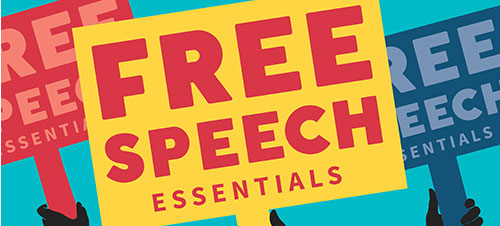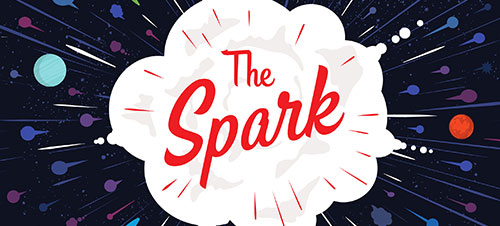December 2018 E-Newsletter
Get info on our newest suite of resources dealing with free speech, free professional development opportunities at your workplace or the Newseum, media literacy surveys and more!
Wishing You the Happiest of Holidays!
![]()
field trips | classes | tools | news | collections

Newest EDCollection Explores First Amendment Foundations, Flare-Ups, Frontiers
From censorship to cyberbullying, the First Amendment and the freedoms it protects are as hotly contested as ever. Our Free Speech Essentials EDCollection explores 16 free speech debates ranging from the founding of our nation to recent headlines to illustrate what free speech means, how far it can go, and challenges surrounding it today. The curriculum aligns with state and national standards as it guides students to take a position, find evidence to support it, and make a compelling argument to their peers. Resources are free with NewseumED registration.
Bringing Free Professional Development to You
NewseumED is offering free professional development workshops at your school or in your district between now and June 2019. (You just provide the audience and location; we pick up our own expenses.) Get First Amendment background and media literacy techniques to help students understand where and how they can exercise freedom of expression in a world of social media and social protests. Find additional information and a request form here.
New Student Class: Is It Fair? Evaluate Your Media
Tune up the "fairness meter" in your students to assess how objective or biased content really is. In our newest class offered at the Newseum, students take a step back from the media negativity to look at the positive: what are the qualities of fair news coverage? In Is It Fair? students learn how to assess word choice, use of context and counterpoints to make informed, impartial evaluations of the news they encounter in print, online and on social media. The class is for grades 7 to 12.
Start the Year with a Free Media Literacy Workshop
The second of two workshops made possible by a Wells Fargo grant is scheduled for Saturday, Feb. 9, 2019, at the Newseum. "Real Media Literacy for a Fake News World" runs from 8:30 a.m. to 2:30 p.m. and is open to D.C.-metro area educators. The program includes professional development, breakfast, lunch, classroom materials and a curatorial session. Using the phenomenon of fake news, attendees will explore the complexities of how information is created, spread and consumed. Explore strategies to help students use technology to discern misinformation. Apply now for the Feb. 9 workshop. Registration is required.
Explore the Information Universe

Bombarded by information? Use our Information Universe lesson plan, video and poster to help students learn to define and identify different types of content, from fact-based reports to advertising to satire. Part of our Fact Finder EDCollection.
Food for Thought
One of our curriculum writers, Kirsti Kenneth, says she found this article in The 74 about how "grit" can be a predictor for civic engagement quite interesting. According to a new study, "gritty" students were more involved in their school and community and more likely to say they planned to vote. The findings made our staffer wonder if there might be a similar correlation with media literacy, in the sense that students with more self-belief and tenacity might be less inclined to believe false stories or be intimidated by the concept of needing to evaluate the information they encounter. It's something to think about.
Participate in a Media Literacy Survey
Do you teach media literacy in your classroom? Be part of the first — and planned annual — report by the National Association for Media Literacy Education (NAMLE) on the state of media literacy in the United States. Designed to assist educators and media literacy organizations with aggregated data that will aid and amplify their work, this survey will look at trends in media literacy education in the U.S., such as:
- who is teaching media literacy
- how people are teaching media literacy
- how people are trained to teach media literacy
- the greatest challenges educators face when teaching media literacy
Take the State of Media Literacy Survey by Dec. 15.
Word of the Year Validates Our Mission. Sadly.
You probably heard that Dictionary.com picked "misinformation" as Word of the Year because of the endless storm of false information online. We are committed to providing you with the resources to help students evaluate information and separate fact from fiction. Find many of our related lesson plans, videos, infographics and more here.
Survey: Youth Support First Amendment, Mistrust Media
The 2018 "Future of the First Amendment" study of high school students by the Knight Foundation finds steady support for the First Amendment, declining news engagement and trust of the media, and a belief that "fake news" is not a significant threat to democracy. The study surveyed 9,774 high school students and 498 teachers across the U.S. Download the entire report.
Follow NewseumED online! Twitter | Facebook | Instagram
555 Pennsylvania Ave., N.W. | Washington, D.C. 20001 | © Newseum